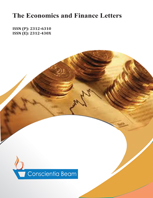Does Exchange Rate Volatility Increase the Consumer Price Index? Evidence from Bangladesh
DOI:
https://doi.org/10.18488/29.v9i1.2923Abstract
The current study aimed to analyze the impact of exchange rate volatility (EXV) on the consumer price index (CPI) with considering export and import. To estimate the targeted results, monthly basis data from 2013M01 to 2019M06 has been used. International financial statistics (IFS) and world development indicators are the key data sources of this study. The estimated results of dynamic regression and quantile regression analysis show that exchange rate volatility has a significant impact to raise the consumer price index in Bangladesh. Import volume and import tax are also liable to raise the price level due to lack of domestic production. Results of dynamic regression demonstrated that the one-period lag of the dependent variable LNCPI(-1) has a positive and significant impact on the current period of CPI where exchange rate volatility has a positive impact on the rising price level. Moreover, this study contributes to the field of international trade and international economics through suggestions and policy coordination.

